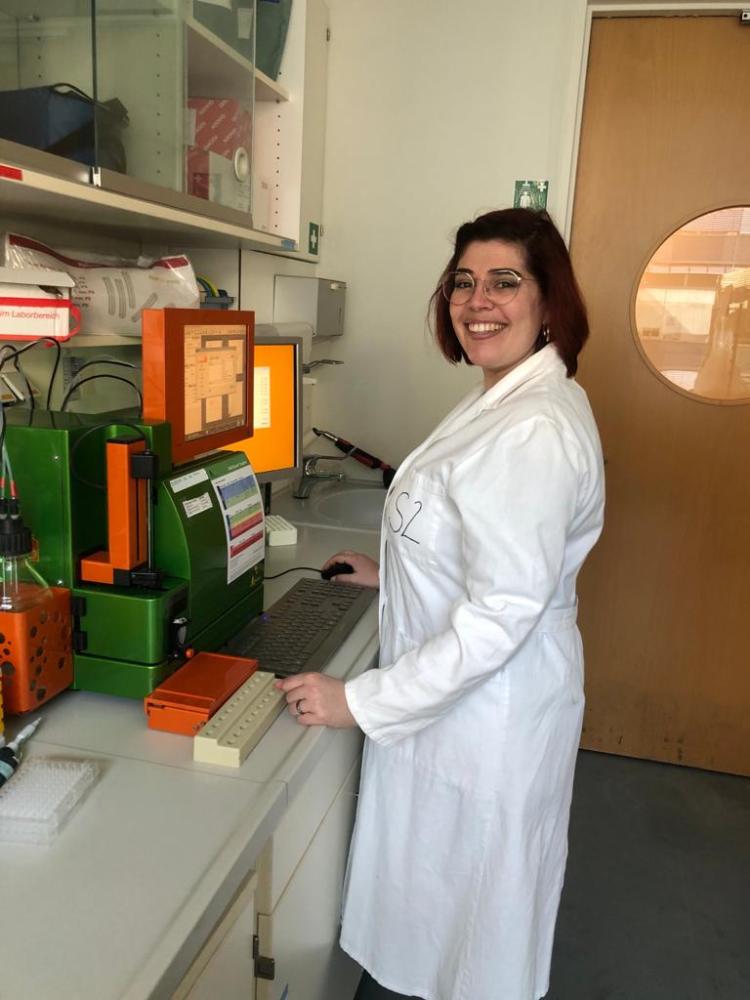
Dr. Marta Ferreira-Gomes is a postdoc at DRFZ – German Rheumatism Research Center Berlin and does research on B cells. In her studies on severe courses of COVID-19 she encountered an unexpected feature of the immune response.

Name / Institute:
Dr. Marta Ferreira-Gomes
DRFZ – German Rheumatism Research Centre Berlin
Leibniz Section C
Research topic:
Maintenance of memory B cells
Main featured instrument or technique:
Single cell sequencing
“I analyzed how B cells from severe COVID-19 patients react to SARS-CoV-2 infection”
Why did you decide to stay in academia after your PhD?
I am just passionate about my work. The idea of contributing to new knowledge pushes me to always do more. And there is rarely real boredom with new projects constantly coming up, which makes it an exciting job. So despite the many challenges we have in academia, I keep wanting to go on.
What was your main research topic in the last 1-2 years before spring 2020?
The focus of my research is how memory B cells – cells that preserve memory on how to produce antibodies against antigens they have encountered – are maintained for long-lasting protection. In order to achieve this, I look at different aspects of these cells such as their generation mechanism, heterogeneity, migration capacity and specificity.
What are the main findings of your work on COVID; and did the results surprise you?
In our study, we analyzed B cells from severe COVID-19 patients that required prolonged intensive care. Because B cells are imprinted by the different proteins present on the site of activation, they are perfect sensors of the ongoing immune reaction. What we could conclude was that in severe COVID-19 cases, B cells start by being imprinted by interferons (proteins released in response to viruses) but with time they become predominantly influenced by TGF-beta, which leads to the production of IgA antibodies. Surprisingly, these antibodies do not target the virus nor do they relocate to the lungs of patients, which means that SARS-CoV-2 triggers a response that no longer targets itself.
Is there any indication what function these IgA antibodies have?
We speculate that these IgA antibodies actually recognize self-antigens – like in autoimmunity. Supporting our hypothesis, more recent studies have indeed described autoantibodies in patients with life-threatening COVID-19.
How has COVID affected your life?
By being involved in this COVID-19 research project, the main change for me was – lots of work! Because patient samples usually arrive later in the day, this meant longer and more unpredictable hours in the lab. But I am a bit of a workaholic, so this made the pandemic a little easier for me.
Did you find a good way to maintain the teamwork aspect during that particular time, or did part of that get lost?
This project was highly dependent on team work, so it only highlighted its importance. While everyone did their part on their own (hygiene rules applying), there was constant communication so that everything would run smoothly between sample preparation and analysis. And the fact that time was of importance really pushed us to look for who had the expertise rather than establishing several new methods ourselves. This also led to fruitful collaborations between working groups and with other institutions.
You have managed to hook your research into the incalculable emerging pandemic. What is your advice for postdocs that want to embrace such a challenging research topic?
It is an extremely competitive topic, so the only advice I have is to embrace it with as much urgency as fighting COVID-19 needs.
What would be the one take-home message of your research?
In severe cases of COVID-19, the SARS-CoV2 triggers a chronic immune response that does not contribute to immunity against the virus itself.
How does your perfect day off work look like?
Definitely spent having a nice lunch or dinner out with friends! I hope we can soon do that again with no pandemic looming around us.
We would like to express our sincere thanks to Dr. Marta Ferreira-Gomes for supporting our new blog interview format with active participation.
Find out more about Dr. Marta Ferreira-Gomes and her work:




Pingback:An update from the communication group – Leibniz PostDoc Network